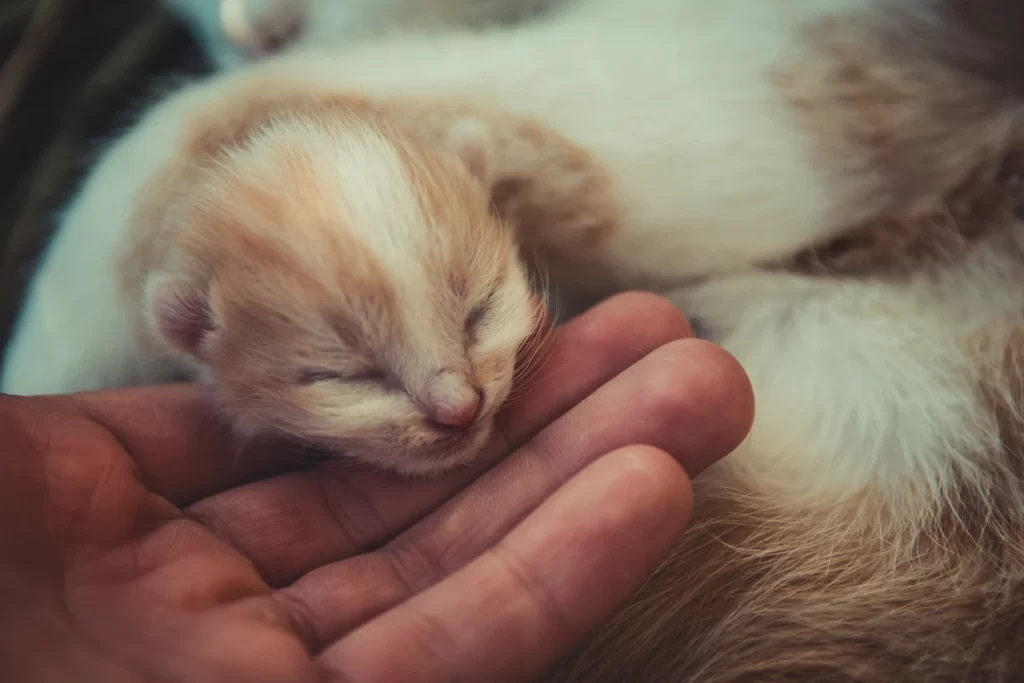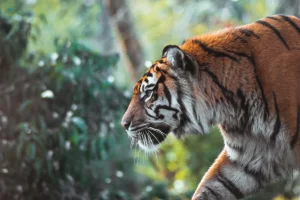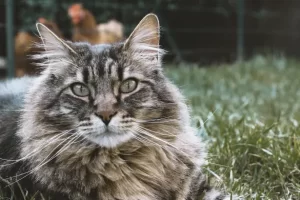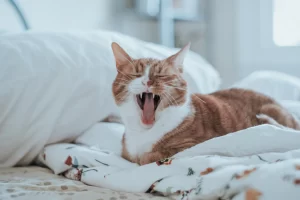Last updated on February 13th, 2023 at 03:20 am

Why do cats eat their babies? If you witness a newborn kitten going missing, you may suspect another cat devoured it. However, if the place is safe and no other animals can access it, you may think it is the mother who did it. However, it’s normal to consider if a mother can harm their young.
Do cats consume their kittens? The basic answer is that cats do consume their young. Mothers eating their young may appear to be cruel and unreasonable. However, for cats, this is completely natural and anticipated behavior. There are five main reasons why they consume their kittens.
- The newborn kitten has died.
- The cat feeds out of mercy.
- The cat is stressed.
- Lack of maternal instinct
Valid Reasons Why Cats Eat Their Babies
We now know that it is possible and normal for cats to eat their babies. But why? Cats displaying this type of behavior are not always indicative of inexperience as mothers. After all, no one wanted to see a mother cat eating their kittens. Let’s explain more about these behaviors and how to possibly avoid them.
The Newborn Kitten has Died
Cannibalism occurs when animals consume another member of the same species, young or old. The term alone produces an intense reaction, as expected. As repulsive as it may be in human conduct, it is equally disgusting in animal behavior. On the other hand, human rationalizations and morality should not necessarily be compared to those of animals. Cannibalism is relatively widespread in the animal kingdom for various reasons.
Animals may give birth to children with sickness, deficiency, bodily deformity, or other health issues. This is common among felines. Problems with a cat’s offspring are not always visible to the human sight, and their scent sense can detect an issue we cannot.
In such instances, the queen cat assumes that her baby will not survive for long. She consumes them to alleviate her child’s pain. Kittens that do not survive birth can be very appealing to predators. Their rotting remains may also represent a health risk to surviving litter.
The placenta and afterbirth provide extra nutrients for milk production in the same way as stillborn kittens do-another justification for eating their young. Mothers who consume frail or stillborn kittens are only trying to give others a better chance of survival.
As distressing as it may appear, this behaviour has biological drives necessary for animals, particularly cats. There are numerous reasons why a mother cat’s young would be stillborn, most of which are related to pregnancy issues.
The mother cat will consume a stillborn kitten. While it may not be pleasant, it is the best method for the mother to deal with her deceased child. Furthermore, it is one way to obtain the nutrients she requires to feed and care for the surviving kids.
The Cat Feeds Out of Mercy
It will appear strange to observe a cat devouring her healthy newborn kitten. One of the most typical reasons a cat eats one of her kittens is when it is unwell or emaciated and unlikely to live. In this case, the mother will consume the kitten to save it from pain. As a result, it receives mercy.
Cats’ incredible sense of smell (14 times more sensitive than humans) is thought to be capable of detecting infections, congenital disabilities, or physical anomalies in kittens. This could be one of the reasons why a mother cat will swallow a seemingly healthy baby. Mothers will only behave this way if they fear their kitten is doomed.
A sick kitten endangers the rest of the litter in two ways.
To begin with, if a kitten contracts a germ or virus, the cat may pass it to the other kittens. This is a risk in terms of hygiene that the mother cat is unwilling to incur. The kitten might have:
- a communicable bacterial illness
- a communicable viral infection
- a communicable fungal infection
Second, if the kitten dies, the infections may quickly spread to other kittens, posing a severe hazard to the entire litter.
In essence, a mother cat may devour its sick kitten to keep the remainder of the litter healthy. This makes sense when you think about it, especially given the power of mother cats’ protective instincts.
The Cat is Stressed
It is uncommon for a domestic cat to consume her kittens due to stress, but it should not be ruled out. If the atmosphere during or after a cat’s childbirth is stressful, the mother cat may exhibit nervous behavior. Environmental stressors may include continual foot activity in the area, loud noises, excessive cat manipulation, or anything that appears threatening.
The cat’s uneasiness is caused by concern for herself and her safety and concern for what might happen to her litter. She may be concerned that her kittens will be removed from her or that some reasons would make her kids more vulnerable to predators. In some situations, the mother cat may consume her kittens due to stress. It may also occur if she considers other animals a threat, especially if she has not socialized with them.
All of this is especially typical among first-time mothers. This is due to stress overpowering their instincts and leading to inaccurate interpretations. As a result, it is critical to provide the greatest care possible to an expectant feline mother during pregnancy to produce a comfortable, tranquil, and stress-free environment.
Lack of Maternal Instinct
A mother cat may not have parental instincts. She may be confused about what to do when her offspring are born and will consume the kittens. This is likewise unlikely, and the reasons behind this are unknown. It is likely that they were separated from their mother too soon or that they have their form of deficit.
We must be cautious after the kittens are born to prevent a mother from devouring her infants owing to a lack of maternal instinct. We should keep an eye on the cat’s behavior. Suppose the mother lacks any maternal instinct (for example, they may not know how to open the kitten’s amniotic sac). In that case, the kitten’s lives are in grave danger. We may need to interfere if we notice the cat ignoring the kittens or immediately attempting to consume them without trying to nurture them. If this happens, you will be responsible for the kitten’s needs. This includes taking care of the newborn kittens.
It’s also possible that the cat doesn’t recognize her kittens. This can happen after the cat has had her kids delivered via cesarean section. Many birth-related hormones that link mother and kitten are not released when this occurs. As a result, the mother does not identify her kittens and consumes them out of fear or bewilderment.
Similarly, in some instances of first-time mothers, the cat may mistake her children for prey rather than her own. This is another reason we must use caution when handling a cat’s kittens. The smell of a human can prevent a mother from recognizing her kittens. However, this is uncommon.
Other Related Questions To Answer
After reading up to this point, I understand if you have additional questions. Because it is crucial for us to give you tons of knowledge about this topic, let’s answer a few related questions.
Do male cats eat kittens?
The short answer is that some male cats do eat kittens. Most father cats are safe around their newborn kittens. Even so, it’s best to keep them apart as a precaution. Please take note that this not apply to all cats. Cannibalism is not really that common in cats and may happen for valid reasons such as starvation, passing genetics, or territorial aggression. Some other male cats (not the father) consume kittens to attract the attention of mother cats who are busy caring for them. The primary objective of male cat eating kittens that are not their own is to pass their own genetics. Killing the offspring of their enemy is their way of stopping that bloodline and try to continue their own bloodline.
Is it safe for male cats to be near newborn kittens?
When it comes to male cats, it is better to keep them away from newborn kittens, especially if they are not their own. Male cats are more likely to kill and eat kittens who are not their own.
These cats do not consume young food. Instead, they consume the kittens so the mother cat may mate with him and have their pups. As a result, keep newborn kittens out of the sight and reach of male cats.
What do mother cats do with their kittens?
A mother cat may exhibit other behaviors to their kittens besides eating them. As a result, there’s nothing to be concerned about if you witness a cat or any other cat doing this.
While some of these actions may appear to be concerning, in fact, normal. Mother cats’ other behaviors toward their offspring include:
- Kittens are frequently moved. Mother cats have a habit of frequently moving their kittens from one location to another. This behavior indicates that the mother cat is not at ease in a certain location. The reason for this is that she either believes it is unsafe or that there are risks around. The viewpoint of a cat differs from that of humans. As a result, what appears to be safe to us may not appear to be safe to them.
- A kitten is rejected. Mother cats are perfectly natural in their rejection of a kitten. A mother cat may devour a kitten, but some reject them. Mother cats with a large litter, such as six or more kittens, cannot care for them. As a result, they are forced to reject some. In addition, some cats can give birth while unwell or malnourished. Such cats are incapable of caring for their young, resulting in rejection.
- Aggression against others. Mother cats are known for their hostility toward other cats. A mother cat should not consume her young for protection. However, she may hiss, grow, or even attack people she perceives as a human or animal threat. As a result, approaching a mother cat is not a good idea. Maintain a safe distance from the mother cat. Only come if she or her baby requires immediate assistance.
- Sitting on top of a kitten. A mother cat may intentionally or unintentionally sit on a kitten. It might be deliberate when she ignores or rejects one of her kittens. For example, a mother cat who refuses to feed her kitten may sit on it and prevent it from feeding. Another accidental cause could be too much stress for the mother cat. The tension stems from the fact that they must care for kittens while not generating adequate milk. As a result, some mother cats inadvertently hurt their kittens. It’s horrible, and it happens to most stressed-out mother cats. Mother cats must use much energy caring for their kittens. As a result, people may unknowingly fall asleep on a kitten. Because newborn kittens are so little, keeping track of them might be difficult for the mother.
You may wonder how you may assist mother cats now that you know their typical actions. You might be intrigued about what you can do, especially with newborn kittens.
Is it okay to handle newborn kittens?
The answer is yes if you are capable of caring for newborn kittens. Even so, it’s important not to do it too often because it can upset the mother cat.
Many people believe that if a person touches a kitten, the mother cat will reject it. However, this is not accurate. Mother cats will not reject a kitten if other people touch it. Even so, keeping your distance from the kittens and the mother is recommended. Allow the mother cat to do her task of caring for her kittens. Only approach if you believe they require assistance.
Is it possible to stop a cat from eating her kittens?
A mother cat will rarely eat a baby; if she does, it will be out of need. Thus, a mother cat’s decision to devour her young is entirely her own, and we have no control over it.
Despite this, there are some things you can do to help a mother cat and reduce the possibility of eating her kittens. They are as follows:
- Make a safe haven for the cat and her kittens.
- Feed your cat some healthy food.
- Avoid disturbing the mother cat and her kittens.
- Separate other pets.
- If there are any issues, consult a veterinarian.
Final Thoughts
What people see as violent, nasty, and savage is typical for cats. They have compelling motives to devour one or more of their kittens. It is important to recognize that you cannot always prevent queen cats from engaging in this behavior.
They possess animal instincts that you lack. This involves determining how many children she can rear from the litter she just delivered. Cats can only communicate their distress through actions, so pay attention and react accordingly. Please provide them with a peaceful environment, a healthy meal, and lots of water. Only mediate when it is essential for the survival of the kitten or the queen cat.
Also read: Do Cats Protect Their Owners?


